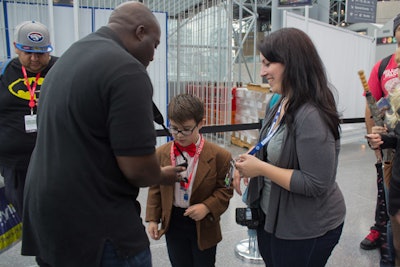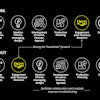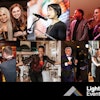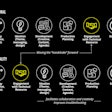
"With great power comes great responsibility." That usually refers to web-slinging superpowers, but it applies to technology, too.
The producers of New York Comic Con got a reminder of that responsibility this past weekend, when they drew strong criticism for a social media initiative tied to the show's R.F.I.D.-enabled badges. Attendees who linked their Twitter presences to their badges found that Comic Con producer ReedPop posted pre-written tweets on their behalf, with language like “So much to see, so much to do!” and “So much pop culture to digest! Can’t. handle. the. awesome."
When the show opened for comic book and video game fans on Thursday, attendees who noticed the ghostwritten tweets complained quickly. ReedPop shut off the function and released a statement on Friday saying, in part, "we were probably too enthusiastic in our messaging and eagerness to spread the good word about NYCC. We have since shut down this service completely and apologize for any perceived overstep."
The misstep made news reports in dozens of media outlets, including Wired, Time, and The New York Post, with headlines like “Comic Con Hijacks Fans’ Twitter Accounts.” Gawker Media video game blog Kotaku called it "one of the worst social media gaffes we've seen in a very long time."
On Tuesday morning, Lance Fensterman, global vice president of ReedPop, spoke about the good and bad of Comic Con's first use of R.F.I.D. badges. While they made for dramatic improvements in security and check-in flow, he said, ReedPop didn’t manage the automated tweets properly.
"We were overzealous," Fensterman said. "We were just trying to be playful and have fun with it. But it was a bad choice. It's one thing to state a fact—'I'm at New York Comic Con'—but it's another to editorialize. The motivation was not sinister. It was playful and fun. We definitely made a mistake."
Fensterman said he learned that event hosts looking to tweet on behalf of attendees need “crystal clear” opt-in language—“it was too vague”—and should probably include the actual language of the tweets.
(Interestingly, just last month, in talking about tips for planning events for super fans, Fensterman recommended having a thick skin when problems occur: “You have to be able to answer. If someone wants to know who's to blame, you have to be able to be held accountable if something isn't right.”)
The social media mistake overshadowed a success story: Fensterman reported that New York Comic Con attracted 134,000 fans (plus 14,000 guests, exhibitors, and journalists) over four days, up from 116,000 registered fans last year. That makes New York Comic Con roughly the same size as Comic-Con International, the unrelated but similar event in San Diego.
The 2013 attendance numbers are also more accurate than in years past, due to the R.F.I.D. program's help in clamping down on fake credentials. While official attendance was up this year, the Jacob K. Javits Convention Center was actually less congested. "We learned our counterfeit badge problem was even more significant than we thought," Fensterman said.
The R.F.I.D. badges also helped manage the flow of attendees entering the show. "It was so efficient,” Fensterman said. “It was the most efficient move-in of people that we've ever had." At one point staffers were admitting 400 people per minute. When the show opened on Sunday morning, it took 37 minutes to get everyone inside—a process that took three or four hours in years past.
Comic Con didn’t take advantage of some of the other uses of R.F.I.D. technology, including sharing information between attendees and exhibitors, and between attendees and their fellow fans—ideas Fensterman may explore in the future.
For now ReedPop has no plan to do anything else to respond to the complaints caused by the automated tweets. "We fixed it the day it happened," Fensterman said. "Now it's a question of how we do it properly going forward, if we do it all."



















